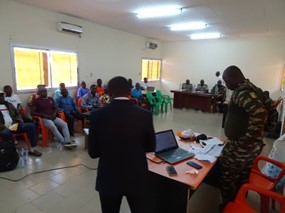Implementation of adaptive livestock management strategies on farms adjacent to water source protection forests and public and private reserves
Renewable energy technologie and antidepredatory strategies
Corporación Serraniagua - Organización de base comunitaria y Valentina Jimenez
Due to their location near forests that protect water sources and public and private reserves, many agricultural productions are vulnerable to human-wildlife conflicts (HWCs). This vulnerability, combined with a lack or inadequacy of farm planning and the prevalence of outdated livestock management practices, puts at risk productivity in these mountain systems, biodiversity conservation, water resources, and associated ecosystem services
We include renewable energy technologies such us solar panels to power electic fences, improve livestoc water availability and sensored lights to mitigate economical loses in livestoc farms caused by predation over domestic animales, at the same time, we help rural farmer families to access electricity serveces and improve their food productivity, economicla and food founts
Funding availability
Landowners willingness to include new technologies in their agricultural system
Adaptive livestock management strategies designed collaboratively with agricultural extension units, local small-scale farmers, and other professionals with relevant experience.
The predation of domestic animals by wild predators has been addressed by local authorities and external foundations as a technical issue, through the implementation of “anti-predation strategies” such as electric fences, corrals, and other protective measures. However, these actions are rarely monitored for effectiveness or continuity and often end with the conclusion of contracts with private implementing entities. Our experience has shown that these measures are more effective when focused on improving farm productivity and the quality of life of small-scale farmers, based on the specific context of each property. Furthermore, monitoring and evaluation are more sustainable and efficient when carried out by local actors such as agricultural extension units, environmental authorities, and community-based organizations, increasing the likelihood of long-term success and continuity of these strategies.
We have implementing replicable technological strategies to mitigate economical losses by wild felids predation reaching a reduction of the 100% of attacks from cougar and jaguar over cattle in the Cerro El Inglés Communitary reserve, protecting vulnerable individuals by solar powered electric fences and motion-sensor lights and limiting the access of domestic animals to the forest by technifying water provision for livestock and solar powered electric fences. Having a demonstrative and replicable system used for education purposes with farmers from the region.
